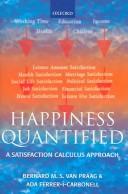| Listing 1 - 8 of 8 |
Sort by
|
Book
ISBN: 9786611852597 Year: 2004 Publisher: Oxford : Oxford University Press,
Abstract | Keywords | Export | Availability | Bookmark
 Loading...
Loading...Choose an application
- Reference Manager
- EndNote
- RefWorks (Direct export to RefWorks)
How do we measure happiness? Focusing on subjective measures as a proxy for welfare and well-being, this book finds ways to do just that.
Happiness --- Satisfaction --- Social sciences --- Social Sciences --- Psychology --- Testing --- Economic aspects --- Methodology --- Research --- Testing. --- Economic aspects. --- Research.

ISBN: 9780199226146 9780198286547 1281852597 0191527599 1435642406 0191607738 Year: 2008 Publisher: Oxford ; New York : Oxford University Press,
Abstract | Keywords | Export | Availability | Bookmark
 Loading...
Loading...Choose an application
- Reference Manager
- EndNote
- RefWorks (Direct export to RefWorks)
How do we measure happiness? Focusing on subjective measures as a proxy for welfare and well-being, this book finds ways to do that. Subjective measures have been used by psychologists, sociologists, political scientists, and, more recently, economists to answer a variety of scientifically and politically relevant questions. Van Praag, a pioneer in this field since 1971, and Ferrer-i-Carbonell present in this book a generally applicable methodology for the analysis of subjectivesatisfaction. Drawing on a range of surveys on people's satisfaction with their jobs, income, housing, marriages, and
#SBIB:303H30 --- #SBIB:303H34 --- Kwalitatieve methoden: algemeen --- Kwalitatieve methoden: grondige gevallenstudie, casework, social work --- Satisfaction --- Happiness --- Social sciences --- Testing. --- Economic aspects. --- Research --- Methodology.
Digital
Year: 2000 Publisher: Munich CESifo
Abstract | Keywords | Export | Availability | Bookmark
 Loading...
Loading...Choose an application
- Reference Manager
- EndNote
- RefWorks (Direct export to RefWorks)
Book
Year: 2011 Publisher: Barcelona Universitat Pompeu Fabra, Centre de Recerca en Economia Internacional
Abstract | Keywords | Export | Availability | Bookmark
 Loading...
Loading...Choose an application
- Reference Manager
- EndNote
- RefWorks (Direct export to RefWorks)
Book
Year: 2019 Publisher: Washington, D.C. : The World Bank,
Abstract | Keywords | Export | Availability | Bookmark
 Loading...
Loading...Choose an application
- Reference Manager
- EndNote
- RefWorks (Direct export to RefWorks)
This paper investigates the link between inequality and demand for redistribution by looking at how individuals form their perceptions of inequality. Most of the literature analyzing demand for redistribution has focused on objective inequality, rather than subjective perceptions of inequality. However, a model that links demand for redistribution to subjective inequality is needed, given that recent empirical research has shown a growing gap between subjective and objective inequality. Using data from the International Social Survey Programme survey, the paper focuses on explaining individuals' formation of inequality perceptions using objective variables. The paper then studies the relationship between these perceptions and individuals' demand for redistribution. The analysis finds that objective macro variables are associated with individuals' perceptions of inequality, and that individual circumstances, some of which relate to self-interest, like age, educational attainment, and income, also play an important role. Perceptions of equality, in turn, are significatively correlated to demand for redistribution and seem to substitute for any effect of objective variables. This result suggests that contextual macro variables only affect individuals' demand for redistribution through their perceptions of equality and do not have a direct effect.
Fairness --- Income Distribution --- Inequality --- Living Standards --- Perceptions --- Poverty Reduction --- Psychology --- Redistribution --- Social Development
Digital
Year: 2010 Publisher: Munich CESifo
Abstract | Keywords | Export | Availability | Bookmark
 Loading...
Loading...Choose an application
- Reference Manager
- EndNote
- RefWorks (Direct export to RefWorks)
Digital
Year: 2011 Publisher: Munich CESifo
Abstract | Keywords | Export | Availability | Bookmark
 Loading...
Loading...Choose an application
- Reference Manager
- EndNote
- RefWorks (Direct export to RefWorks)
Book
Year: 1999 Publisher: Amsterdam : Vrije universiteit,
Abstract | Keywords | Export | Availability | Bookmark
 Loading...
Loading...Choose an application
- Reference Manager
- EndNote
- RefWorks (Direct export to RefWorks)
| Listing 1 - 8 of 8 |
Sort by
|

 Search
Search Feedback
Feedback About UniCat
About UniCat  Help
Help News
News